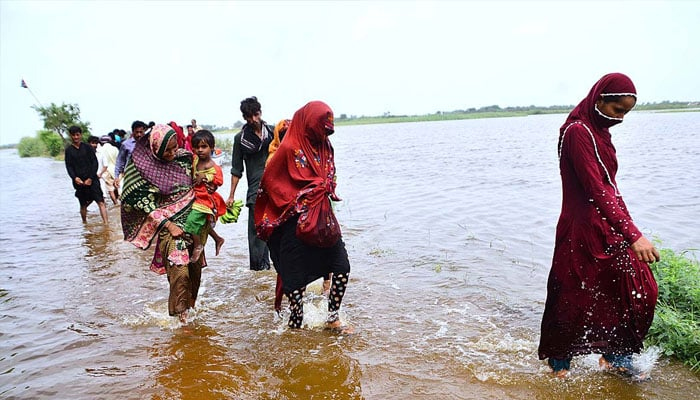Women’s specific needs are neglected during disaster situations: report
The Gender Inclusive Disaster Risk Management project has exposed the shortcomings in disaster response, and underscored the neglect of women’s specific needs during disaster situations, especially when displaced and without essential resources.
The project also highlighted the non-economic costs, including emotional trauma, humiliation, exclusion, harassment and discrimination, faced by marginalised segments of society, particularly women, during emergency responses.
As many as 10 case studies of affected women from various districts in Sindh were conducted under the said project by the Indus Consortium, which is actively engaged in addressing women’s sufferings, safeguarding and protection issues during and after the 2022 flood in the province.
It is worth adding here that the flood of 2022 was a devastating event that impacted 38 per cent of Pakistan and displaced 33 million people, including 75,000 pregnant women.
According to a press release issued by the Thar Foundation, in partnership with Oxfam in Pakistan, the Indus Consortium recently organised a women’s assembly in Karachi to highlight the humanitarian issues faced by the people affected due to the 2022 flood, emphasising the need for an early warning system and safeguarding vulnerable communities, especially women, during disasters.
The event’s aim was to empower women’s voices on safeguarding and protection issues in disaster situations, while government ministers, parliamentarians, civil society activists, the academia, the affected individuals and communities were actively involved in the assembly.
During the assembly the case study report was unveiled, as various organisations, including the VDO Ghotki, the Nari Foundation Sukkur, the VSO Dadu, the SDF Sanghar and the LHDP, gathered the stories of affected women in the case studies.
Sindh Human Rights Department Administrator Samreen Paras, NED University Department of Economics & Management Sciences Chairman Prof Dr Raza Ali Khan, PDMA Operations Manager Imdad Hussain, fisherfolk community representative Fatima Majeed, Sukkur Women Protection Cell Incharge Marvi Awan, activist Aisha Dharejo and Sida’s Masroor Shahwani actively participated in the discussion.
Senator Dr Khalida Sikandar Mandhro chaired the session on ‘Unheard Voices of Grassroots’, while caretaker minister for school education, college education and women empowerment Rana Hussain chaired the session on ‘Women Safeguarding Issues During and Post Disasters’.
The interim minister announced plans to include a lesson on disaster risk reduction in the curriculum, a suggestion put forth by the Pakistan Disaster Management Authority. She highlighted Sindh’s progress in policymaking, emphasising the empowerment of women in the province.
She stressed the importance of creating space for development, even among women who may not have received formal education. She advocated for the increased use of technology and the inclusion of AI to help people better understand relevant issues.
Dr Khalida acknowledged the suffering of entire families during the floods, with women and children enduring the most hardship. Acknowledging that what is done cannot be undone, she stressed the need to look forward and unite efforts for disaster relief. She called for collaboration between the government and civil society ahead of disasters.
Sindh Commission on the Status of Women Chairman Nuzhat Shirin requested that the PDMA involve women in policymaking, and stressed the importance of collaboration between civil society and government departments, particularly the PDMA.
It is pertinent to mention here that the Indus Consortium is an umbrella organisation of 64 civil society organisations, academic institutions and humanitarian NGOs registered with the Securities Exchange Commission of Pakistan under Section 42 of the Companies Ordinance of Pakistan.
-
 Epstein Case: Ghislaine Maxwell Invokes Fifth, Refuses To Testify Before US Congress
Epstein Case: Ghislaine Maxwell Invokes Fifth, Refuses To Testify Before US Congress -
 Ferrari Luce: First Electric Sports Car Unveiled With Enzo V12 Revival
Ferrari Luce: First Electric Sports Car Unveiled With Enzo V12 Revival -
 Chappell Roan Parts Ways With Wasserman Music Over CEO's Ties With Epstein
Chappell Roan Parts Ways With Wasserman Music Over CEO's Ties With Epstein -
 Andrew Mountbatten Windsor Publically Shamed After Brother And Nephew Change Decades Old Royal Rule
Andrew Mountbatten Windsor Publically Shamed After Brother And Nephew Change Decades Old Royal Rule -
 Jon Stewart On Bad Bunny's Super Bowl Performance: 'Killed It''
Jon Stewart On Bad Bunny's Super Bowl Performance: 'Killed It'' -
 Savannah Guthrie Receives Massive Support From Reese Witherspoon, Jennifer Garner After Desperate Plea
Savannah Guthrie Receives Massive Support From Reese Witherspoon, Jennifer Garner After Desperate Plea -
 Celebrities Take Sides As Brooklyn Beckham’s Feud With David, Victoria Heats Up
Celebrities Take Sides As Brooklyn Beckham’s Feud With David, Victoria Heats Up -
 Prince Harry Reacts As Beatrice, Eugenie's Names Surface In Epstein Emails
Prince Harry Reacts As Beatrice, Eugenie's Names Surface In Epstein Emails -
 Cyprus Joins European AI Race: What It Means For Greek LLMs And Regional Innovation
Cyprus Joins European AI Race: What It Means For Greek LLMs And Regional Innovation -
 Amazon Soon To Launch 'AI Content' Marketplace, Says Report
Amazon Soon To Launch 'AI Content' Marketplace, Says Report -
 Is AI Reliable For Health Advice? New Study Raises Red Flags
Is AI Reliable For Health Advice? New Study Raises Red Flags -
 WhatsApp Web Starts Rolling Out Voice And Video Calling For Beta Users
WhatsApp Web Starts Rolling Out Voice And Video Calling For Beta Users -
 Catherine O’Hara’s Cause Of Death Finally Revealed
Catherine O’Hara’s Cause Of Death Finally Revealed -
 Swimmers Gather At Argentina’s Mar Chiquita For World Record Attempt
Swimmers Gather At Argentina’s Mar Chiquita For World Record Attempt -
 Brooklyn Beckham, Nicola New Move Could Leave David, Victoria Reeling
Brooklyn Beckham, Nicola New Move Could Leave David, Victoria Reeling -
 Anthropic Criticises ChatGPT Ads As OpenAI Begins Testing Advertising In AI Chats
Anthropic Criticises ChatGPT Ads As OpenAI Begins Testing Advertising In AI Chats




